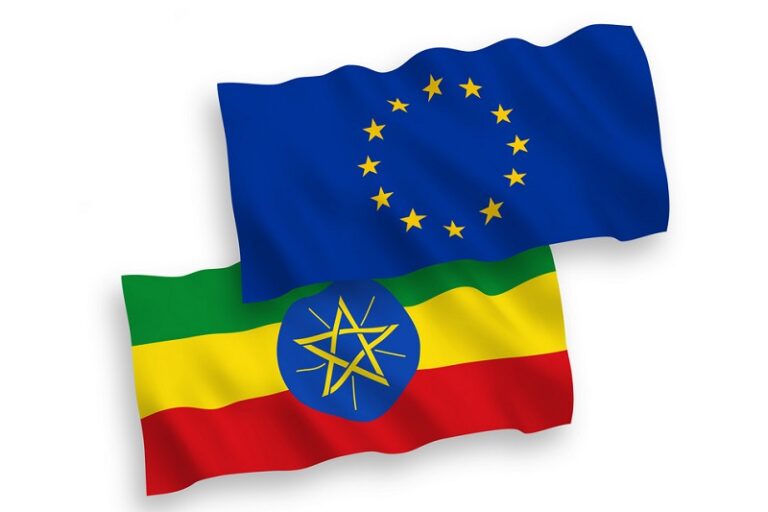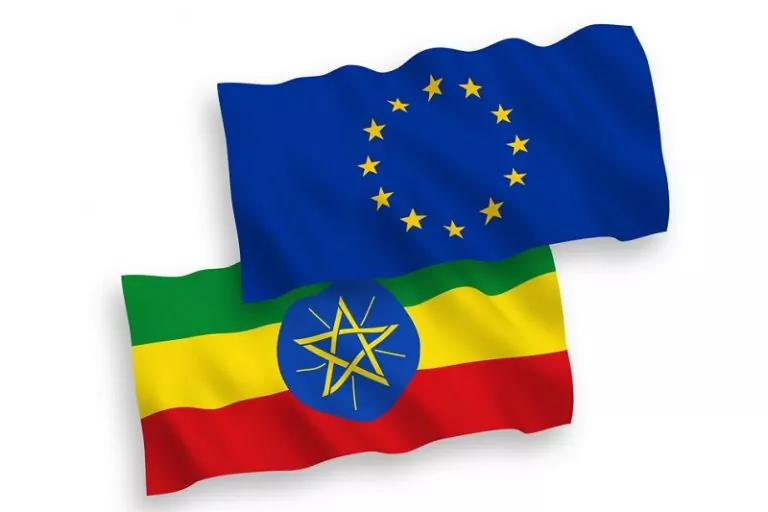

flags of european union and ethiopia on a white background
In a significant development on Tuesday, October 3, Ethiopia and the European Union (EU) inked a cooperation agreement worth 650 million euros ($680 million). This pact aims to bolster mutual relations and facilitate Ethiopia’s post-war recovery and economic reforms.
During a press conference held in Addis Ababa, Ethiopian Finance Minister Ahmed Shide and European Union Commissioner for International Partnerships Jutta Urpilainen jointly announced the agreement. Urpilainen emphasized that, following the ceasefire signed in November of the previous year, it was time to normalize relations and rebuild a mutually beneficial partnership with Ethiopia. She referred to this aid package as “the first concrete step” in this process.
Initially, the EU had allocated an aid package of 1 billion euros ($1.04 billion) for Ethiopia, scheduled for disbursement from 2021 to 2027. However, this aid was put on hold due to the conflict that erupted in the northern Tigray region in late 2020. Now, at a “critical juncture” for Ethiopia, Prime Minister Ahmed welcomed the funding, recognizing its role in facilitating post-war recovery and much-needed economic reforms. He stated, “This strategic partnership is now back on track,” noting the positive development.
Urpilainen clarified that direct fiscal support to Ethiopia’s government would remain suspended until “very clear political conditions” were met. The reinstatement of this support hinged on satisfying these conditions. Furthermore, she highlighted the importance of an International Monetary Fund (IMF) program, which was deemed necessary initially.
Urpilainen expressed support for the execution of the peace agreement through national dialogue, accountability, and transitional justice. The Tigray conflict, marred by massacres, charges of forced starvation, and widespread rape, resulted in numerous casualties. The EU has consistently asserted that normalizing relations with Ethiopia would require holding those responsible for these atrocities accountable.
In response to the United Nations investigation, Ethiopia has initiated its own transitional justice process. However, human rights experts have raised concerns about the efficacy of this process. The European Union reiterated its backing for the peace pact’s implementation and stressed the importance of national dialogue and accountability.
The United Nations experts issued a warning, emphasizing the need for additional independent investigations into Ethiopia’s dire human rights situation. They highlighted the imminent risk of further deterioration and called on the international community to ensure that investigations persist to address human rights violations and prevent future tragedies.
In a report released a month ago, a United Nations panel documented grave and ongoing atrocities in the Tigray region and raised questions about the commitment of Ethiopian officials to genuine accountability. Human Rights Watch recommended that the European Union present a resolution to the United Nations Human Rights Council, urging the continuation of investigations into past atrocities.
This cooperation agreement between Ethiopia and the European Union represents a significant step in rebuilding relations and supporting Ethiopia’s recovery while maintaining a focus on accountability for past atrocities.
US Secretary of State Marco Rubio ordered South African Ambassador Ebrahim Rasool to leave America by March 21 because he…
Early 2025 ends with IPL fever in India and cricket fans receive good news of an international schedule full of…
National teams from Africa advance their World Cup qualification pursuit as they take part in Matchday 5 of the qualifiers.…
Creative Africa Nexus (CANEX) is running the Book Factory Prize for Publishing in Africa again to award $28,000 to African…
Canadian companies have expanded their presence as major African mining stakeholders and invested more than $37 billion. Africa holds the…
The South African government wants people to plant one million trees across the nation within a single day on September…
This website uses cookies.